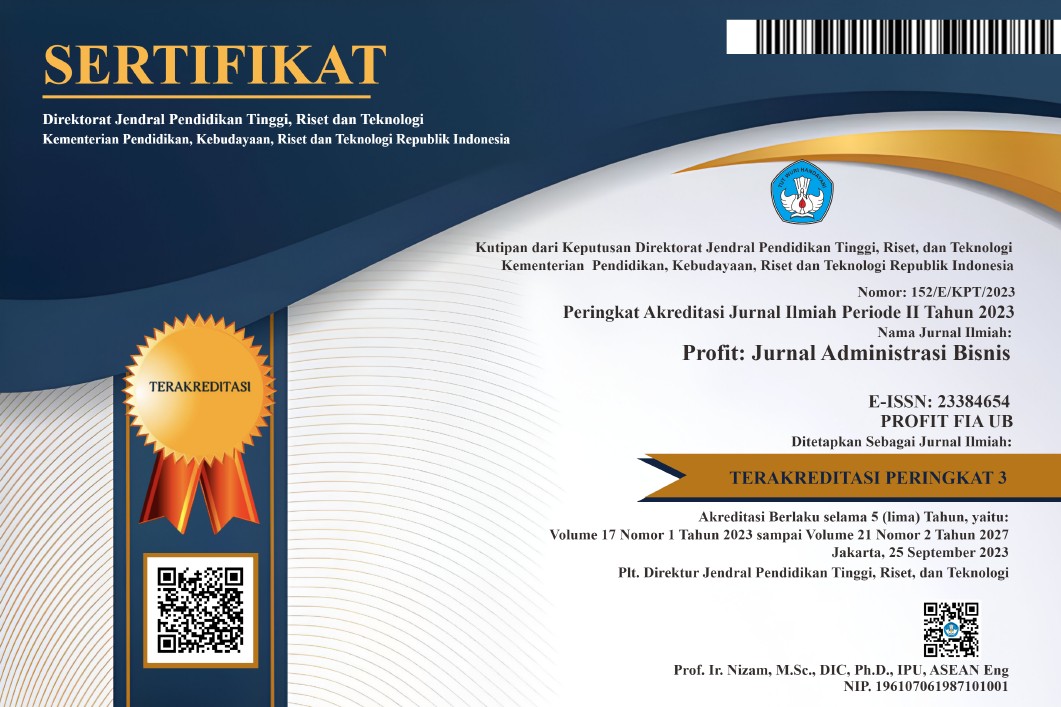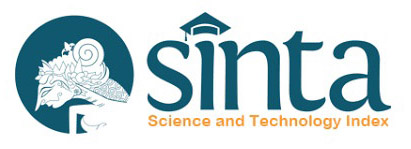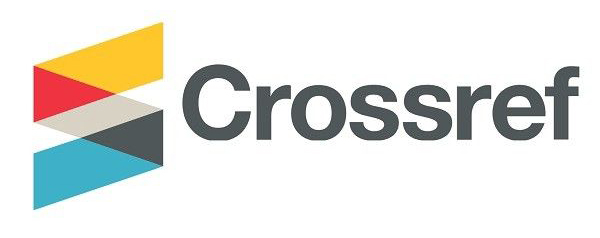PENGGUNAAN OJEK SYARIAH SEBAGAI MODA TRANSPORTASI MUSLIMAH URBAN: MEREK ATAU RELIGIUSITAS?
DOI:
https://doi.org/10.21776/ub.profit.2021.015.01.14Keywords:
Sharing Economic, Halal Transportation, Online Motorcycle Taxi, Sharia Brand, ReligiosityAbstract
The increasing need for travel in the local area of the house (staycation) such as shopping, culinary, health and education tours have encouraged the use of various modes of public transportation in urban communities. In the midst of these conditions, Muslimah's need for public transportation that meets the principles of sharia values and is safe from harassment and urban crime, OJESY is here as the first and only sharia motorcycle taxi for women in Indonesia. This study analyzes whether Muslimah consumers choose to use OJESY services because of the sharia brand offered by OJESY or because of consumer religiosity. The respondents of this study were 116 Muslim women using OJESY in Malang City, East Java. By using multiple regression the results of this study indicate that both the brand of sharia and religiosity show a significant and positive influence on customer decisions to use Islamic motorcycle taxi services, but religiosity is the main stimulus so spiritual-driven plays an important role in Muslimah decisions to use public transportation while maintaining the Islamic values it adheres to.
References
Ahmad, Khaizie Sazimah, Nurul Hidayah Mat Nor, Sharina Shariff, Nurul Zamratul Asyikin Ahmad (2012) Determinants Of Purchase Intention Towards Halal Products Between Rural And Urban Muslim Consumers In Malacca, International Conference On Islamic Economy And Business
Akyol, M. and Kilinc, O. (2014), “Internet and Halal Tourism Marketingâ€, Electronic Turkish Studies. 9(8), 171-186
Alserhan, B.A. (2010). Islamic branding: A conceptualization. Journal of Brand Management, 18(1), 34-49.
Assauri, Sofjan. (2004). Manajemen Pemasaran. Jakarta: Rajawali PressDin, K.H. (1982) Tourism in Malaysia – competing needs in a plural society, Annals of Tourism Research, 9, 453-480
Duman, T. (2011), Value of Islamic Tourism Offering: Perspectives from the Turkish Experience. Paper presented at World Islamic Tourism Forum (WITF 2011), Malaysia
Fianto, Achmad., Yanu Alif., Djumilah Hadiwidjojo., Siti Aisjah and Solimun (2014) The Influence of Brand Image on Purchase Behaviour Through Brand Trust. Business Management and Strategy, 5 (2), 58-76
Friman, M., Lättman K., Olsson L.E. (2020) Public transport quality, safety, and perceived accessibility, Sustainability, 12 (9), 3563
Garrison W.L and Levinson, D.M (2006) The Transportation Experience: Policy, Planning, and Deployment, Oxford University Press, New York.
Golnaz, R., Zainal, A.M. & Mad-Nasir, S. (2012), Assessment of Consumers’ Confidence on Halal Labelled Manufactured Food in Malaysia, Social, Science. & Humanities. 20 (1), 33-42.
Haque A, Rahman S, Ahmed IS (2011a). Factors influencing purchase of foreign goods by Malay Muslim consumers: a structural equation modelling approach on religiosity and ethnocentrism perspectives. The Social Sciences 6(5):420-428.
Haque, Ahasanul, Sabbir Rahman and Farzana Yasmin (2011b) Exploring the Relationship between Religiosity, Ethnocentrism and Corporate Image: Young Muslim Consumers Perspective, Journal of Business and Policy Research, 7(1). Special Issue. Pp. 60 – 71
Jalil, D.M.A. and Rahman, M.K. (2010), “Financial transactions in islamic banking are viable alternatives to the conventional banking transactionsâ€, International Journal of Business and Social Science , 1 (3), pp. 219-233.
Kotler, Philip and Gary Armstrong. (2001). Prinsip-Prinsip Pemasaran. Jilid 1. Erlangga, Jakarta
Kotler, Plilip.(2000). Manajemen Pemasaran. Edisi Mileinium. Jakarta : PT. Indeks Kelompok Gramedia.
Shaari, J. A. N. and Arifin, N. S. (2010) Dimension of Halal Purchase Intention: A Preliminary Study. International Review of Business Research Papers, 6(4), 444–456
Vittel, Scott J,(2009) “The Role of Religiosity in Business and Consumer Ethics: A Review of the Literature†Journal of Business Ethics, 90, pp. 155-167
Wulfert, T. (2019). Mobile App Service Quality Dimensions and Requirements for Mobile Shopping Companion Apps. Junior Management Science, 4(3), 339–391.
Yusof, Y. M., and Jusoh, W. W. (2014). Islamic branding: the understanding and perception. Procedia-Social and Behavioral Sciences, 130, 179-185.
Downloads
Published
Issue
Section
License
The copyright of the received article shall be assigned to the journal as the publisher of the journal. The intended copyright includes the right to publish the article in various forms (including reprints). The journal maintains the publishing rights to the published articles.

This work is licensed under a
Creative Commons Attribution-NonCommercial 4.0 International License

















